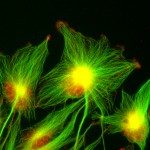Lien vers Pubmed [PMID] – 30858195
J. Cell. Sci. 2019 Apr;132(7)
Microtubules play a crucial role in mesenchymal migration by controlling cell polarity and the turnover of cell adhesive structures on the extracellular matrix. The polarized functions of microtubules imply that microtubules are locally regulated. Here, we investigated the regulation and role of two major tubulin post-translational modifications, acetylation and detyrosination, which have been associated with stable microtubules. Using primary astrocytes in a wound healing assay, we show that these tubulin modifications are independently regulated during cell polarization and differently affect cell migration. In contrast to microtubule detyrosination, αTAT1 (ATAT1)-mediated microtubule acetylation increases in the vicinity of focal adhesions and promotes cell migration. We further demonstrate that αTAT1 increases focal adhesion turnover by promoting Rab6-positive vesicle fusion at focal adhesions. Our results highlight the specificity of microtubule post-translational modifications and bring new insight into the regulatory functions of tubulin acetylation.This article has an associated First Person interview with the first author of the paper.


